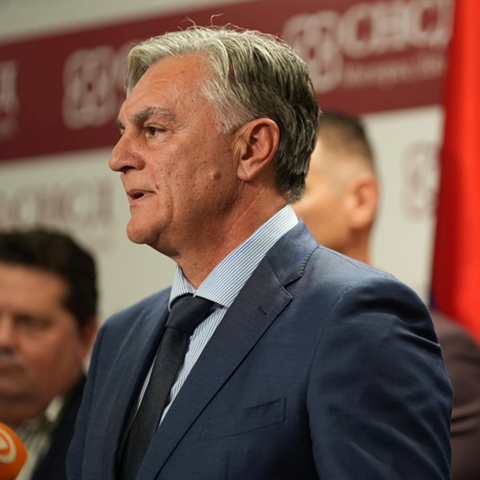When Siniša Karan stepped before supporters on election night to declare that the “Serb people have won once again,” he was not simply claiming victory in Republika Srpska’s snap presidential race. He was signaling continuity—continuity of power, continuity of confrontation with Bosnia and Herzegovina’s central institutions, and continuity of a political project shaped for decades by Milorad Dodik.
For many observers, Karan’s ascent is less a change of leadership than an extension of the system Dodik built. The long-time security official, academic, and political loyalist has spent most of his career in the engine room of Republika Srpska’s state apparatus. Now, as president, he becomes the public face of a political architecture that has grown increasingly assertive toward Sarajevo and increasingly aligned with Moscow.
A Career Forged in Security Structures
Born in 1962 in Grabovac near Beli Manastir, Karan began his career in the mid-1980s in police and intelligence structures—an institutional world that would define his professional identity for decades. Over the next twenty years, he held senior posts in internal security: head of criminal investigations in Sarajevo, chief of the RS Criminal Suppression Directorate, and later head of investigative and financial-intelligence divisions within Bosnia and Herzegovina’s state-level security agency (SIPA).
Such roles placed him at the center of some of the country’s most sensitive political and security questions. They also built the foundation for his later rise inside the leadership circle of Dodik’s Alliance of Independent Social Democrats (SNSD).
By 2008, Karan had moved fully into the political sphere, serving first as security adviser to the RS president, then for a decade as general secretary to the presidency and later to the government. Each post deepened his proximity to Dodik and strengthened his reputation as the leader’s most reliable operator on constitutional and domestic-security matters.
Architect of Institutional Confrontation
Karan’s name first drew national attention in 2016, when he chaired the commission that organized the referendum on January 9 as “Republika Srpska Day”—an act twice ruled unconstitutional by Bosnia’s Constitutional Court. The referendum was ultimately annulled, and Karan was charged alongside other officials; the case was later dismissed, a result that only reinforced his stature inside the ruling party.
In the years that followed, Karan became one of Dodik’s principal legal and political strategists for challenging state-level institutions and expanding entity authority. His role deepened in 2023 and 2024, when SNSD formed a working group tasked with drafting legal pathways for a possible RS secession from Bosnia and Herzegovina. According to the U.S. Treasury Department, that group’s work placed Karan at the center of efforts to undermine the Dayton settlement. In January 2024, Washington sanctioned him for what it described as “secessionist activity” and for participation in commemorations of RS’s unconstitutional holiday.
A Presidency Defined by Continuity
Karan’s election—publicly endorsed by Dodik before any votes were counted—was presented by SNSD as a defense of entity sovereignty against alleged “foreign interference.” His own victory speech, framing the election as resistance to outside “usurpers,” echoed Dodik’s long-standing narrative of the RS as a threatened political community.
Asked what his first steps as president would be, Karan offered no new agenda. “I will continue where we left off,” he said, underscoring the expectation that his presidency is meant to preserve, not reinvent, the political order built over the past two decades.
Parallel to his security career, Karan cultivated an academic profile. A political science graduate from Sarajevo and later a professor of constitutional law in Banja Luka, he authored textbooks and dozens of scholarly papers. He served on faculties across several private universities in Republika Srpska.
This academic dimension has given him an additional role in the SNSD system: helping translate political objectives into legal and constitutional language. Within the party, he is regarded as the figure most capable of articulating entity positions in institutional and legal terms—an asset in a system that increasingly relies on constitutional maneuvers to challenge state authority.
An Inheritance of Tension

Karan assumes the presidency at a moment of deep political polarization. Relations between Banja Luka and Sarajevo remain strained; Western governments continue to warn against secessionist rhetoric and moves; and Russia has tightened its political foothold in Republika Srpska.
Whether Karan will push the entity further down a confrontational path or simply manage Dodik’s agenda with fewer theatrics remains uncertain. But few expect significant departures from the current trajectory. His career—rooted in security, disciplined in legalism, and aligned consistently with Dodik’s project—suggests a presidency oriented toward consolidation rather than change.
What is clear is that the political architecture of Republika Srpska now rests in the hands of a figure who helped design it. And in that sense, Siniša Karan represents less a successor than the system’s most loyal custodian.



